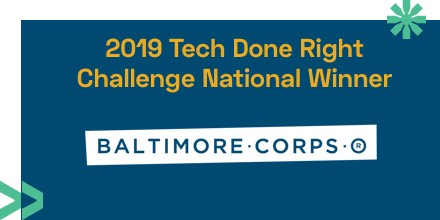Baltimore Corps received $100,000 through a national challenge to develop a platform to address racial and gender bias in tech hiring.
The organization focused on equity and racial justice was one of 10 winners nationwide of the Tech Done Right Challenge, which was launched by the Oakland, California-based Kapor Center.
“By building a tool that controls for biases in hiring practices, Baltimore Corps is repairing the leaky pipeline for people of color and women seeking placement in the tech field,” Kapor Center said in a Medium post announcing the organizations receiving grants. “This tool will serve stakeholders across Baltimore’s tech ecosystem to mitigate systemic barriers, including the lack of social capital and networks.”
The Kapor Center made a total of $1 million available through the Tech Done Right Challenge to support local efforts aimed at building a more diverse and inclusive tech sector. Kapor Center received 120 applications from 48 U.S. cities.
In developing the platform, six-year-old Baltimore Corps is building on its work connecting people of color and gender minorities to social impact careers. In the work of sourcing, screening and matching talent, many of the same barriers apply in the tech sector, said Baltimore Corps Director of Development Dani Faulkner.
“People of color and gender minorities have a consistently harder time accessing employment opportunities because they are excluded from social networks and because of racial and gender bias that permeates within the hiring process,” Fauklner said. “After placement in a social impact position, these individuals are disproportionately less likely to be promoted and more likely to leave because the culture of the organizations are hostile toward their identities.
Within the social impact sector, Baltimore Corps applies a model that includes building a diverse pool of talent and a network that views their work and organizational culture through an equity lens, and working with members of the network to “target and dismantle traditional sources of bias,” Faulkner said.
Baltimore Corps has grown opportunities — in the last three years, its applicant pool grew by 800% while program participants who are people of color have increased from 64% to 79%. But while the participants are continuously placed in roles like program management and community engagement, there’s still a smaller percentage in data and tech roles. It’s not for a lack of demand, however, as organizations are consistently asking for tech talent.
And Baltimore Corps Director of Data, Technology, and Evaluation Billy Daly said that many technologists are graduating every year from programs specifically geared toward developing data and tech skills among groups that are historically underrepresented.
“Through this process we’ve recognized that while generalized recruitment works for many functional areas, some — like data and technology — require their own pipeline, both to source underrepresented talent with those skills and to help organizations recruit and retain them more effectively and with a focus on equity,” Faulkner said. “What’s needed to establish a truly robust tech pipeline in tech spaces is a platform and a network to coordinate these resources and to dismantle the barriers that are draining both talent and opportunities from it.”
In building the social impact tech jobs platform, Baltimore Corps is focusing on three areas:
- Providing a central hub that’s focused specifically on Baltimore’s social impact tech community, and building partnerships with both the programs that are sources of tech talent and the organizations that provide opportunities
- Vetting candidates to create a pool of talent that fits the needs of the role, and a candidate’s commitment to social impact
- Removing bias by working with organizations to create descriptions that remove info that is “nonessential to the function of that role but that may result in the exclusion of otherwise qualified candidates,” Daly said; additionally, resumes will be tailored for each role
Daly said open questions remain about the best way to validate someone’s competency beyond accomplishments and length of experience, and capturing the importance of culture fit within an organization while pushing organizations to build a diverse team, and how the practices they’ve developed for the social impact sector as a whole apply to data and technology.
As they develop the platform and explore these questions, the Kapor Center will also work with all of the organizations through a cohort model, and share collective learnings. That group also includes D.C.-based tech inclusion nonprofit Byte Back, which expanded to Baltimore this year.







